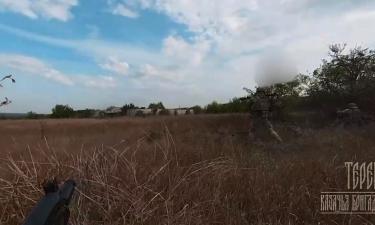From Past Myths to Present Reality
 Terrorism has existed throughout the history of humanity
Terrorism has existed throughout the history of humanity
However, it has only recently started to attract the world community's attention. The reason is more available information, the fact that terrorists posses or might possess in the future increasingly destructive means to wage their struggle, including weapons of mass destruction - chemical, biological or even nuclear weapons. In addition, the current information openness makes terrorism even more effective in terms of its influence on the overall international situation.
No matter how hard we try to stop terrorism, it will continue spreading, because the situation in the majority of disintegrating and unstable regimes in Asia, Africa, parts of Latin America and even some recently formed countries on the territory of the former Soviet Union, is quickly deteriorating. Decent living conditions and access to the wealth of global civilisation remain a distant dream for people living in these states. At the same time, the same people can see pictures of a much more prosperous world on their TV screens. The contrast inevitably evokes protest and resentment, which can lead to terrorist activities.
Unfortunately, humanity has so far been unable to find effective recipes to overcome the crisis. Poorly developed and unstable countries constitute more than half of the UN members. Certainly, we must try to develop a comprehensive strategy to assist these countries. However, we must not forget, at the same time, the experience of European countries that allocated large funds for charitable purposes in the 1970s-1990s, and faced negative consequences instead of achieving positive results. Material aid to developing countries has led, in almost every case, to a further deterioration of the situation. Many countries assumed that they were entitled to such assistance and the levels of corruption only increased.
At present, Europe is a rather safe region in terms of the terrorist threat. The majority of terrorist acts occur in the Middle East, the United States, Muslim countries and in Russia. However, taking into account how quickly terrorism spreads, we should expect an increase in terrorist activities in Europe, as well. Moreover, this continent is very vulnerable in this sense, as it is inhabited by many people who have close ties with unstable regimes, and the number of these people is constantly growing. Most probably, Europe still has the remnants of terrorist networks, which have not been discovered in the two years after the September 11, 2001 tragedy, when European security services destroyed the majority of local terrorist organisations under pressure from the United States. In that respect, it is logical to assume that only a miracle can save Europe from the spread of terrorism in the foreseeable future.
So, what can we do? Firstly, we have to understand that the source of terrorism is the ineffective nature of the system of international relations and our misperceptions with regard to that system. We are still supporting legends and myths glorifying national liberation movements. However, they have created more than a hundred unstable regimes with horrible internal situations. We are also used to believe that countries must have sovereignty. But how many of these countries cannot ensure basic order on their territories and provide their citizens with decent living standards? Moreover, they cannot stop the rise of radical movements that assume international proportions. It is obvious that the traditional understanding of the term "sovereignty" is utterly outdated. On the other hand, we should carefully consider its new interpretation.
One cannot present recipes for a drastic restructuring of the system of international relations in the confines of a short article. Nevertheless, there are obvious measures that we can take immediately. In Europe, we must implement the concept of a "unified security space" proposed by French President Jacques Chirac. This space should include all European countries, EU countries and Russia. It must be anti-terrorist and police-based, rather than military-political. Its creation must be ensured through the close co-operation of security, intelligence, law enforcement, customs and immigration services of all countries in greater Europe. It would be the first step towards the reduction of the terrorist threat.
We also need a consolidated effort to develop European proposals aimed at the reform of the entire system of international organisations, including the United Nations. At present, this organisation is not capable of dealing with new challenges to global security, including terrorism. This does not merely refer to the outdated mandate of the UN Security Council, which was adopted in 1945. We certainly need to expand the number of permanent Security Council members, accept new key world powers that can influence their respective regional situations. Above all, this means India, Japan, and Germany.
Finally, joint efforts are needed to overcome the present split in the so-called old Atlantic Alliance. It refers to the dispute between "old" and "new" Europe even more. The existing disagreements only divide Europe in the face of new challenges. It should be emphasised that terrorism is just one of these challenges, and maybe not even the most dangerous. The most threatening is the proliferation of nuclear weapons, the possibility that they may end up in the hands of irresponsible regimes in unstable countries. Some of these states have already gained access to nuclear weapons.
In conclusion, we need to develop a unified policy of the civilised world towards the unstable world. These words may sound like imperialistic propaganda and every proponent of the democratisation of international relations and human rights, and those who strictly oppose the use of preventive strikes, may reject them. One cannot disagree with them. Cold reasoning in the interests of global stability will not become a norm for a community of civilised countries for a long time. However, the global situation demands a drastically new policy, a more stringent, more realistic policy, based on future reality rather than on the myths of the glorious past.
Sergei Karaganov, RIAN
Subscribe to Pravda.Ru Telegram channel, Facebook, RSS!





